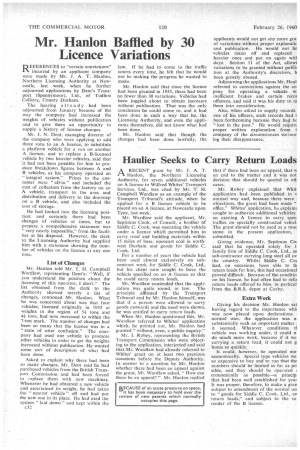Mr. Hanlon Baffled by 30 Licence Variations
Page 70

If you've noticed an error in this article please click here to report it so we can fix it.
REFERENCES to "certain convictions" 1. incurred by an applicant company were made by Mr. J. A. T. :Hanlon, Northern Licensing Authority at Newcastle, last week, when he further adjourned applications by Dent's Transport (Spennymoor), Ltd., of Tudhoe Colliery, County Durham.
The hearing aire a d y had been adjourned from January because of the way the company had increased the weights of. vehicles without publication and to give them an opportunity to supply a history of licence changes.
Mr. J. N. Dent, managing director of the company who were applying to add three vans to an A licence, to substitute a platform vehicle for a van on another
A licence, and to replace a B-licensed vehicle by two heavier vehicles, said that it had not been possible for .him to produce breakdown figures between A and
B vehicles, as his company operated an " integral system." Prices to the customer were " all-in " and included' the cost of collection from the factory on an A vehicle, transport to the area and distribution and delivery to the doorstep on a B vehicle, and also included the cost of storage.
He had looked into the licensing position, and certainly there had been changes of vehicles at times, but to prepare a comprehensive statement was very nearly impossible," from the facilities at his disposal. However, the clerk to the Licensing Authority had supplied him with a statement showing the number of vehicles on the licence at any one time.
List of Changes
Mr. Hanlon told Mr. T. H. Campbell Wardlaw, representing Dent's: "Well, if you understand the position about the licensing of this operator, I don't." The list obtained from the clerk to the Authority showed merely a list of changes, continued Mr. Hanlon. What 'he was concerned about was that four vehicles, licensed originally in 1955 at weights in the region of 54 tons and 44 tons, had now increased to within the 7-ton mark. The number of changes had been so many that the licence was in a "state of utter confusion." The company had used one vehicle to promote other vehicles in order to get the weights increased without publication. He wanted some sort of description of what had been done.
Asked to explain why there had been so many changes. Mr. Dent said he had purchased vehicles from the British Transport Commission and had been forced to replace them with new machines. Whenever he had obtained a new vehicle and ascertained its weight, he had taken the "nearest vehicle" off and had put the new one in its place, He had used the system "laid down" and kept within the c.32 law. If he had to come to the traffic courts every time, he felt that he would not be making the progress he wanted to make.
Mr. Hanlon said that since the licence had been granted in 1955, there had been no fewer than 30 variations. Vehicles had been juggled about to obtain increases without publication. That was the only conclusion he could come to, and it had been done in such a way that he, the Licensing Authority, and even the applicants themselves, did not know what had been done.
Mr. Hanlon said that though: the changes had been done lawfully, the applicants would not get any more gra; of variations without proper explanatic and publication. He would not ha vehicles taken off and replaced heavier ones and put on again witl days. Section 11 of the Act, allowi variations to be granted without publii tion at the Authority's discretion, h been grossly abused.
Adjourning the applications Mr. Hanl referred to convictions against the co pany for operating a vehicle w inefficient brakes and certain rem offences, and said it was his duty to ta them into consideration.
Also, when asked to supply records one of his officers, such records had r been forthcoming because they had be "lost in the post." He would require proper written explanation from t company of the circumstances sari-our ing their disappearance.
























































































































































































































